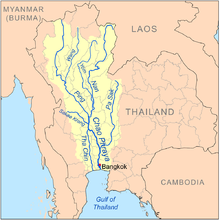

The Tha Chin river (Thai: แม่น้ำท่าจีน, RTGS: Maenam Tha Chin, pronounced [mɛ̂ːnáːm tʰâː tɕīːn]) is a distributary of the Chao Phraya river, in Thailand. It splits in the province of Chai Nat and then flows west from the Chao Phraya through the central plains, until it empties into the Gulf of Thailand in Samut Sakhon province.
Regional names
The Tha Chin river has many regional names. After it splits from Chao Phraya River at Chai Nat, it is called Makham Thao River or Khlong Makham Thao; while passing Suphan Buri it is the Suphan River; while passing Nakhon Pathom it becomes the Nakhon Chai Si River. Only near its mouth at Samut Sakhon does it become the Tha Chin River, named after the former name of Samut Sakhon. The name Tha Chin is the convention used in most scientific documents.
The word "Tha Chin" literally translated as "pier of Chinese", owing in the past more than 1,000 years ago, the area where the Tha Chin river flowed through today in Samut Sakhon Province. It was the residence of a large number of Chinese people. And they still have their heirs to this day. Therefore, the area where the Tha Chin river flows through Samut Sakhon which is the destination, it is also known by the Teochew dialect "Leng Kia Chu" (Chinese: 龍仔厝; pinyin: lóng zǐ cuò), which means "home of the descendants of the dragon".
Tributaries
Main article: Tributaries of the Chao Phraya RiverTributaries of the Tha Chin include Huai Krasiao, Huai Mae Thawip, Khlong Chorakhe Sam Phan, and Khlong Bang Len.
Tha Chin basin
The Tha Chin drains a total area of 13,681 square kilometers (5,282 sq mi). The Tha Chin Basin is part of the Chao Phraya Watershed.
Transportation in the past
In the past, there used to be passenger boats running back and forth on the Tha Chin River from Suphan Buri to Tha Tian Pier in Bangkok. From time to time, passengers will disembark at Wat Ngiu Rai Railway Station to travel by train to Bangkok. The passenger boat business was owned by the private company Suphan Steam Packet Company.
Later, when land travel developed and became more convenient. Therefore, water transportation was sluggish. The passenger navigation business on the Tha Chin River therefore ceased in the early 1960s.
Health of the river
The Thai Pollution Control Department (PCD) has reported that the water quality of rivers flowing into the upper Gulf of Thailand has seriously deteriorated in the past decade. The department found the Tha Chin estuary contains bacteria and nutrient pollution from phosphates, phosphorus, and nitrogen. Nutrient pollution causes algae to grow faster than ecosystems can handle, harming water quality, food resources for aquatic animals, and marine habitats. It also decreases the oxygen that fish need to survive. PCD rated water quality in the river in 2015 as "poor". The PCD findings indicated large amounts of wastewater were discharged into the river from households, industry, and agriculture.
References
- Sirichaiekwat, Wichan (2023-01-16). ""เล่งเกียฉู่" ที่มิใช่ร้านขายยาง" ["Leng Kia Chu" which is not a tire shop]. Sakhononline (in Thai). Retrieved 2023-05-28.
- Basins of Thailand
- "ท่าจีน" [Tha Chin]. Thai PBS (in Thai). 2022-03-20. Retrieved 2022-03-22.
- Thailand State of Pollution Report 2015 (PDF). Bangkok: Pollution Control Department. ISBN 978-616-316-327-1. Retrieved 23 September 2016.
- Wangkiat, Paritta (25 September 2016). "Breach of trust". Bangkok Post. Retrieved 25 September 2016.
15°13′33″N 100°04′44″E / 15.22583°N 100.07889°E / 15.22583; 100.07889
| Suphan Buri topics | |
|---|---|
| Geography | |
| Buildings | |
| Transport | |
| Parks and grounds | |
| Other topics | |
This article related to a river in Thailand is a stub. You can help Misplaced Pages by expanding it. |